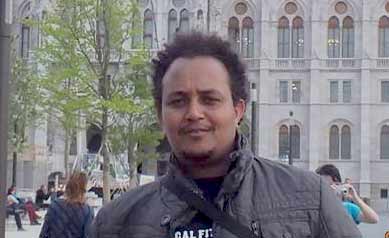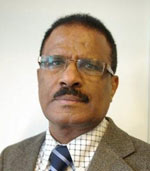Is Giving The Kebessa Eritrean Population A Black Eye A Solution?
Commentary on Aklilu Zere’s series of articles By G. Ande
Aklilu Zere is no doubt a dubiously “clever” writer with a stinging pen but readers may still learn something from his narratives. The major problem I have with his works is that he makes a lot of insidious and insensitive remarks that suggest that he may have a thinly veiled contempt for the kebessa people of Eritrea. The very fact that he came out of the closet to express his admiration for Ali Salim – a writer who aroused a big outcry in the Eritrean web community for painting the whole Kebessa people with one brush by tagging them derogatorily as land thieves (grabbers) and enablers of the Eritrean regime – suggests that Aklilu Zere might be out there to finish Ali Salim’s unfinished business. Secondly, in spite of his flashy show of erudition, he sounds like a person who would poke your eyes with a pointed finger, or give you a black eye (whichever comes first) if you dare to disagree with his points of view. So, with out much ado, I will try to take him on his own words and ask him to explain some of the comments he made that many members of the Eritrean kebessa community may find offensive.
In his narratives Aklilu Zere portrays the kebessa community as one that is hanging on to life by its finger nails due to the harsh and desolate living conditions in Highland Eritrea. In his writings he has made destitution, hunger and deprivation of basic necessities of life the distinguishing trade marks of the Kebessa people. In an article titled, Food & Eating Etiquettes In Kebesa../ he writes, “.In Kebesa they followed the footsteps of their beloved Sgem and Ater. They looked scraggy and emaciated but they survived.To eat, only to survive, required strict discipline and self abnegation. The former was reinforced by the good women who taught and conditioned the children,….. and the later by the monks who introduced, enforced and monitored strict fasting rules to adults.”..People eat to live or to enjoy food if they are from the lands of abundance, but not in Kebesa. Eritrean highlanders ate to survive. They would do anything to survive and preserve their being because they valued the sanctity of life. They feared and hated death ……
In the same article, Aklilu Zere continues writing, “In Kebesa food related news
were always exiting and most of the time the news were carried and delivered by adventurers, men who ventured away from home to the yonder. Some descended westward to the lowlands and some descended eastward to the lowlands. Those men were our Vasco Dagamas and Ibn Batutas, very curious and venturesome. Those who returned from the west [Mirabawi Kola] told people in Kebesa what they saw:
people swimming in lakes of milk [Tseba]; people who bathed in buttermilk [Birah]; people who creamed their body with butter [Likai]; people who oiled their hair with choice fat [Tsbhi] and people who only ate fresh meat. No one could believe them, specially the monks and the women. To the people of Kebesa such place was only reserved for the soul and that was only after death.”
I am not even going to attempt to comment on the above extracts because they are self-explanatory. The only comment I am going to make on this parody is my suspicion that Aklilu Zere may be a Siamese twin of Ali Salim. I will recite to readers another narration made several centuries back by an expeditionary European traveler. “The ……tie an ox to a tree and come on charging towards the ox on mule back and slice off meat from the ox and eat it raw….This act is repeated several times until all the meat on the ox is consumed and only the bare bones are left under the tree …”
This was James Bruce writing about the Ethiopians.
Like James Bruce, Aklilu Zere also overstretches the figments of his own imagination by creating two parallel
worlds in contemporary Eritrea. One desolate kebessa inhabited by “scraggy and emaciated” people and the other region, lowland Eritrea, where people are seen “swimming in lakes of milk [Tseba]; people who bathed in buttermilk [Birah]; people who creamed their body with butter [Likai]; people who oiled their hair with choice fat [Tsbhi] and people who only ate fresh meat. ”
Aklilu Zere’s mindset is not out of character in the opposition camp in view of
the fact that there are a great number of other writers who hold the Kebessa people of Eritrea guilty by association for the excesses of the regime in Eritrea owing to the misguided “belief ” that these people are the enablers and benefactors of the cruel Eritrean regime. There is a great deal of extended anger out there that has blurred the vision of the so called opposition groups and thus rendered them hopelessly ineffective, haphazard and disparate in their effort to bring about change in Eritrea – an unfortunate development which probably got writers like Ali Salim, Aklilu Zere into being caught in their own opposition underwear and prompted them to busy themselves in hate literature.
The desperation on the part of the opposition has resulted in the proliferation of writers and opinion leaders who are trying to use the kebessa people as their punching bags to release their own anger on the regime and their ineptness to make a dent on the powers of the regime through a united effort of all Eritreans. This development is putting many kebessa Eritreans on their guard and if the worst comes to the worst the “hardy people” will have to weigh their options and oil their guns to secure their collective interest. Let us pray that things do not come to that kind of exigency and hope that the Eritrean people will remain united to find a common solution for their common problems without polarizing themselves on the basis of ethnic and regional differences. Let’s be watchful of hate literature in whatever form it may come on our screens. After all black eying the kebessa people could not be a solution.



Awate Forum